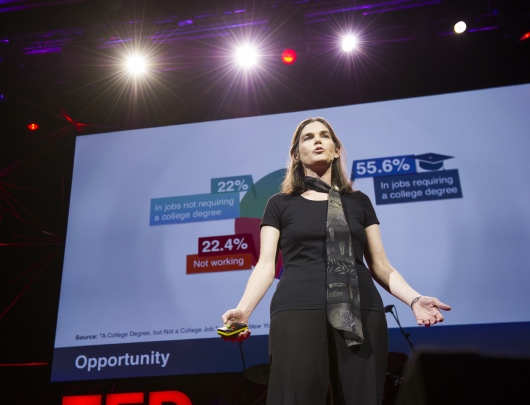It would cost you a minimum of $37,000 to enroll for a year at one of the top 10 schools in the United States, according to the U.S. News & World Report. However, anyone with a computer will now be able to take courses from half of those schools … for free.
At TEDGlobal 2012, Stanford University professor Daphne Koller introduced us to Coursera.org, an effort to bring rigorous college courses online to anyone who wants them. At the time, Coursera offered classes from Princeton University, the University of Michigan, Stanford University and the University of Pennsylvania. However, today, Coursera announced partnerships with seven more top colleges in the United States: California Institute of Technology, Duke University, Georgia Tech, the University of Virginia, Johns Hopkins Bloomberg School of Public Health, Rice University, the University of California San Francisco, the University of Washington, and the University of Illinois Urbana-Champaign.
At the same time, Caltech and the University of Pennsylvania have extended a combined $3.7 million investment in the site. And three international schools — the University of Edinburgh, the University of Toronto and Ecole Polytechnique Federale de Lausanne — have also signed agreements with Coursera.
When Koller spoke at TEDGlobal in late June, Coursera’s stats read as such: 680,000 students from 190 countries viewing 14 million videos and taking 6 million quizzes in 1.6 million course enrollments across 43 courses. However, with this new infusion, Coursera will now be offering about 111 classes.
Each class — and topics range from “Bioelectricity: A Quantitative Approach” to “Fantasy and Science Fiction: The Human Mind, Our Modern World” — has a definitive start date, and includes comprehension testing.
In her TEDTalk, Koller explained that Coursera was created after her Stanford colleague Andrew Ng offered a machine learning class online for free and had about 100,000 people enroll. But the benefits of the site go beyond offering great classes to anyone interested. By collecting every click, homework submission, quiz and forum note from tens of thousands of students, Coursera is a data mine that offers a new way to study learning.
“We can transform the study of human learning from hypothesis-driven to data-driven mode,” Koller explained.

Comments (81)
Pingback: What is the Future of College Education? | Business Education Tips
Pingback: Course Corrections | Innovations
Pingback: Green 101: Back to School with Coursera’s Intro to Sustainability | F that S
Pingback: FREE Conference: SALÓN INTERNACIONAL DE LA EDUCACIÓN, SIE 2012 (Entrada Liberada) | Profesorbaker's Blog: A Bit of Everything
Pingback: Conferencia Gratis: SALÓN INTERNACIONAL DE LA EDUCACIÓN, SIE 2012 (Entrada Liberada) | Edcamp Santiago
Pingback: 12 Great Free Online Courses | Tech Information
Pingback: Daphne Koller: What we’re learning from online education | Video on TED.com « lennyesq
Pingback: 12 great free online courses « Content Curated By Darin R. McClure & a few photos
Pingback: 12 great free online courses | Krantenkoppen Tech
Pingback: EvergreenPM blog » Formación gratuita y en las mejores universidades.
Pingback: My nerdy little heart is all aflutter! « The Readist
Pingback: TED Blog | Completely free online classes? Coursera.org now offering courses from 16 top colleges |
Pingback: L’actualité pédagogique et du monde de la formation #21
Pingback: How to Get a Superior Online Education, for Free « Transmedia Newswire